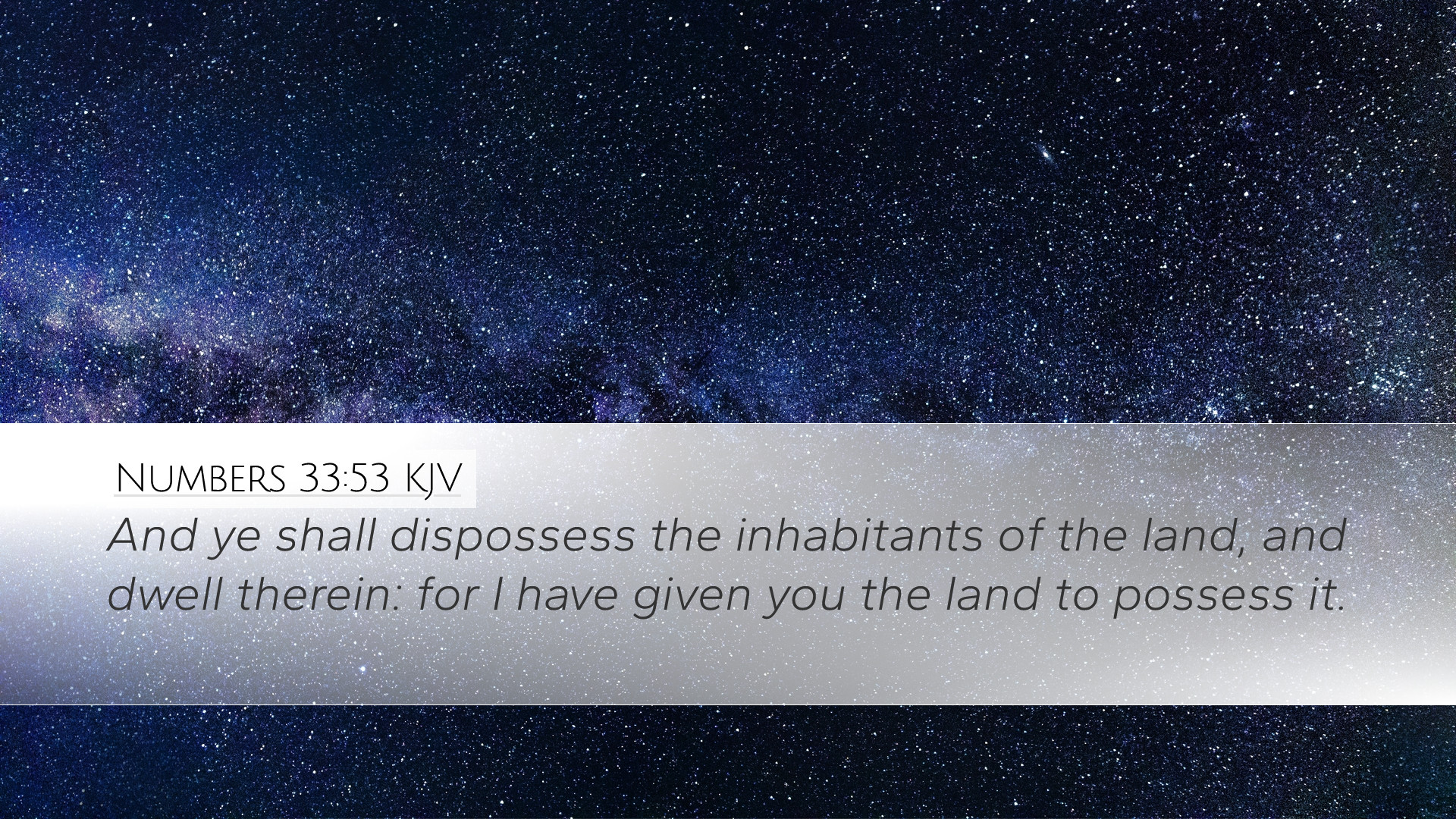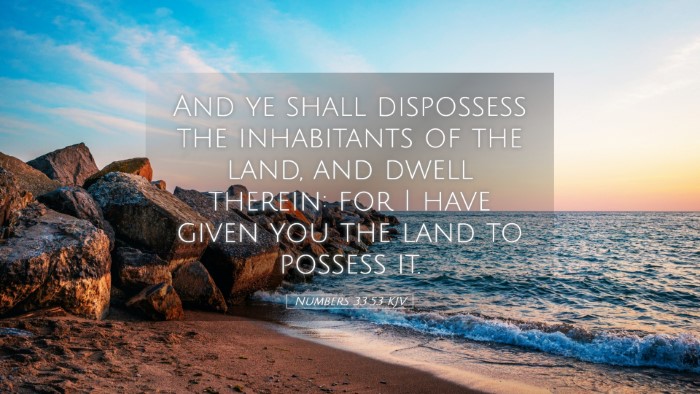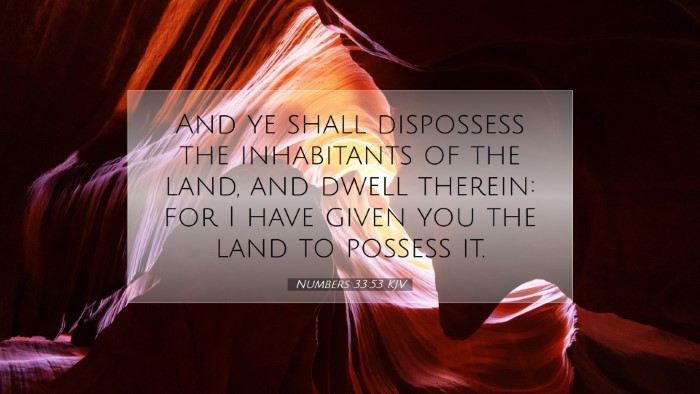Bible Commentary on Numbers 33:53
Verse: “And ye shall dispossess the inhabitants of the land, and dwell therein: for I have given you the land to possess it.” (Numbers 33:53)
Introduction
The book of Numbers presents a crucial period in the journey of the Israelites as they transition from slavery in Egypt to the Promised Land. As they gather at the border of Canaan, God issues clear instructions regarding the conquest and settlement of the land. Numbers 33:53 serves as a pivotal verse, encapsulating the divine command to dispossess the Canaanites and the assurance that the land is a gift from God. This commentary synthesizes insights from notable public domain scholars to provide a comprehensive understanding of this verse and its implications for the reader.
Contextual Background
In the preceding chapters of Numbers, particularly in Chapters 32 and 33, we observe the preparations and the final stages of the Israelites’ wilderness journey. The verse in question comes after a detailed recounting of the journey of the Israelites, signifying not only a physical transition but also a spiritual one, as they prepare to claim their inheritance.
Historical Significance
Historically, the Canaanites were a people entrenched in their land, worshiping various idols and practicing abhorrent rituals. God’s command to dispossess them is understood as both a judgment on these practices and a means of protecting His chosen people from contamination. As Matthew Henry remarks, “they were to drive out the inhabitants, that they might not only be free from their idolatry but also that the land might become a fit habitation for His people.”
The Idea of Possession
The concept of ‘possessing’ the land is crucial. Albert Barnes explains that possession is not merely an act of taking but is deeply tied to relationship and legacy. It emphasizes God’s ownership and the responsibility of the Israelites to steward the land according to God’s commandments.
Exegesis of the Text
Breaking down Numbers 33:53, we can observe three main components:
- Divine Command: “And ye shall dispossess the inhabitants of the land.”
- Occupational Intent: “and dwell therein.”
- Divine Assurance: “for I have given you the land to possess it.”
Divine Command
The first part of this verse underscores a direct command from God. Adam Clarke notes that this command encompasses both the martial aspect of driving out the inhabitants and the spiritual imperative of maintaining purity from their practices. The Israelites are entrusted with a holy mission— to eradicate corruption and evil from the land.
Occupational Intent
The directive “and dwell therein” implies a deeper significance. It is not simply about conquering but also about establishing a new identity as God’s people in the land He promises. Henry emphasizes, “Their dwelling in the land symbolized a new beginning, a new covenant relationship with God, where they would thrive and bear witness to His majesty.”
Divine Assurance
The reassurance in “for I have given you the land to possess it” reflects God’s sovereignty and faithfulness. This gift is not earned but graciously bestowed. Barnes reflects on this saying, “The land, though occupied by others, was nonetheless legally theirs by divine decree.” This assurance reinforces the idea that the battle they face is already won through God’s promise.
Theological Implications
Numbers 33:53 opens profound theological discussions regarding God's nature, His promises, and humanity's role in His redemptive plan. The command to dispossess the Canaanites mirrors God's call for holiness and separation from sin.
Holiness and Separation
By commanding the Israelites to remove the inhabitants of Canaan, God emphasizes the necessity of holiness. Clarke points out that God desired His people to remain undefiled; otherwise, they risked falling into idolatry and immorality. The act of dispossession serves as a foreshadowing of the spiritual warfare that believers face today in resisting sin and pursuing holiness.
Promises and Faithfulness
This verse profoundly illustrates God’s promises. The assurance that He has given the land highlights His faithfulness to His covenant. As Christians reflect on this, it serves as a reminder that God’s promises transcend time and circumstance. Henry remarks, “The land, given to them not for their righteousness, but for His, is a lens through which we see grace in action.”
Application for Today
For contemporary Christians, the themes arising from Numbers 33:53 remain poignant. The call to “dispossess” invites a self-examination of what holds sway in one’s life. Are there sins or habits that need to be driven out to fully embrace the life God has promised?
Spiritual Warfare
Believers are called to engage in spiritual warfare, much like the Israelites were tasked with physically confronting their enemies. The acknowledgment of God’s already established victories should embolden believers to pursue holiness and righteousness.
Stewardship of God's Promises
Moreover, understanding that we possess promises from God should lead to accountability and stewardship. Each believer is tasked with embodying these promises in their lives, living as testimonies to God’s faithfulness, just as the Israelites were to do in Canaan. Barnes reminds us that “possession comes with responsibility—to cultivate, nurture, and preserve what God has graciously given.”
Conclusion
Numbers 33:53 serves not merely as historical narrative but as a rich theological foundation for understanding God's call to His people. As they stood ready to enter the Promised Land, the Israelites were reminded of their mandate to remove idolatry from their midst while resting in the assurance of God’s promises. This delicate balance of responsibility and inheritance continues to resonate through the ages, offering profound insights for pastors, theologians, and students of the Word today.
As we reflect on this passage, we are called not only to understand the historical and theological ramifications but also to engage actively in the ongoing story of redemption and holiness that God invites us into.


